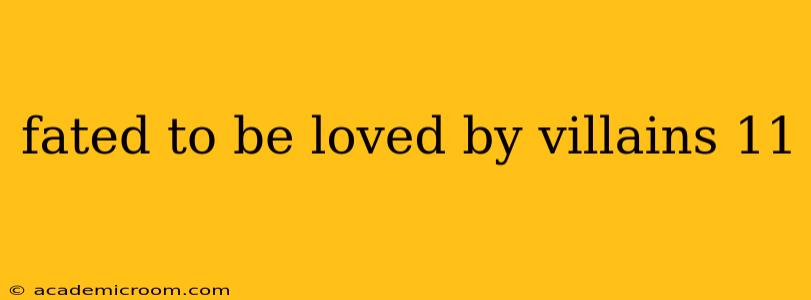Fated to be Loved by Villains: Exploring the Trope's Enduring Appeal
The "fated to be loved by villains" trope, prevalent in romance novels, fanfiction, and even some mainstream media, captivates audiences with its intriguing premise: a seemingly ordinary protagonist inexplicably draws the attention—and affection—of morally ambiguous or outright villainous characters. This isn't simply a case of "opposites attract"; it delves into complex power dynamics, forbidden desires, and the exploration of good versus evil, often challenging conventional notions of romance. But what makes this trope so enduringly popular? Let's delve into the reasons behind its captivating appeal.
Why are readers so drawn to this specific trope?
The appeal lies in several intertwined factors. Firstly, it subverts expectations. The traditional "hero-saves-damsel" narrative is flipped on its head. The protagonist, often underestimated or seemingly powerless, becomes the object of desire for those typically positioned as antagonists. This unexpected power dynamic creates intrigue and suspense. Readers are drawn to the forbidden nature of the relationship, the inherent risk, and the unpredictable trajectory of the narrative.
Secondly, the trope allows for exploration of complex character development. Villains, by their very nature, are often multi-faceted. The "fated to be loved" trope provides an opportunity to explore their motivations, vulnerabilities, and inner conflicts. The protagonist's influence, often unintended, can serve as a catalyst for change, leading to character arcs that resonate deeply with readers.
Finally, the inherent conflict in such relationships provides ample dramatic tension. The love story unfolds against the backdrop of moral ambiguity and potential danger. The reader is left wondering: will love conquer all? Will the villain redeem themselves? This uncertainty fuels engagement and keeps readers hooked until the very end.
What makes a "fated to be loved by villains" story compelling?
A compelling story within this trope goes beyond the simple premise. It requires well-developed characters, a believable narrative, and skillful execution. The protagonist's character must be strong enough to stand against the villain's influence, even while being drawn to them. The villain's motivations and actions need to be consistent and understandable, even if morally reprehensible. The narrative should explore the emotional complexities of the relationship, the challenges they face, and the consequences of their actions.
How does the trope differ from other romance tropes?
Unlike typical romances where the conflict often stems from external forces or misunderstandings, the "fated to be loved by villains" trope places the central conflict within the relationship itself. The moral ambiguity, the power imbalance, and the potential for danger are inherent to the core narrative. This makes the stakes higher and the emotional journey more intense. It's not simply about finding love; it's about navigating a morally gray area and confronting the consequences of love's unpredictable path.
Are there sub-tropes within "fated to be loved by villains"?
Yes, several sub-tropes exist within the broader category. For example, the villain might be genuinely reformed through love, or the relationship may remain morally ambiguous, with the protagonist accepting the villain's flaws and the risks involved. Some stories might highlight the protagonist's own morally gray areas, challenging the clear-cut good vs. evil dichotomy. The possibilities are endless, allowing for a wide range of interpretations and narrative styles.
What are some examples of this trope in popular media?
While pinpointing exact examples solely relying on this trope is difficult, many stories incorporate elements of it. Certain anime, manga, and novels feature protagonists who unexpectedly capture the attention of powerful, morally ambiguous figures. Look for stories where the main romantic interest is undeniably villainous or at least occupies a morally gray space, and the central romance is a significant plot point despite this character's actions. Analyzing the power dynamics and the emotional complexities of the relationship within these narratives can illuminate the enduring appeal of this specific trope.
In conclusion, the "fated to be loved by villains" trope's enduring appeal stems from its subversion of expectations, its potential for complex character development, and its inherent dramatic tension. It's a trope that challenges traditional romance narratives, explores the complexities of human nature, and captivates audiences with its unpredictable and emotionally charged stories. By understanding the nuances of this trope, readers and writers alike can better appreciate and explore its full potential.
